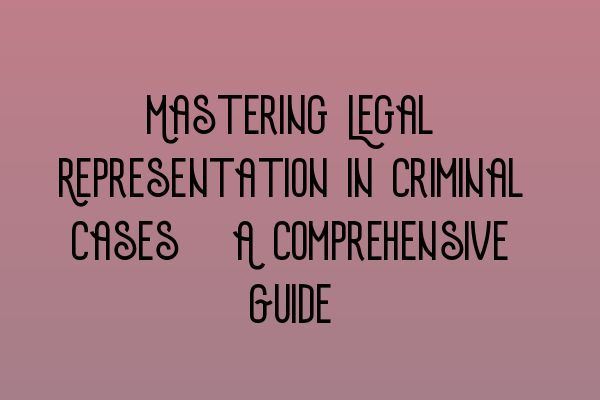Mastering Legal Representation in Criminal Cases: A Comprehensive Guide
As a criminal law solicitor, your role is crucial in ensuring fair representation and justice for your clients. Effective legal representation requires a deep understanding of criminal law and the ability to navigate complex cases with expertise. In this comprehensive guide, we will provide you with valuable insights and strategies to help you master legal representation in criminal cases.
Understanding Criminal Law
Before diving into the intricacies of legal representation, it is essential to have a solid understanding of criminal law. Familiarize yourself with key concepts such as elements of a crime, mens rea, actus reus, and defenses. A strong foundation in criminal law will enable you to craft compelling arguments and identify potential weaknesses in the prosecution’s case.
Building Rapport with Clients
Establishing a strong rapport with your clients is vital for effective legal representation. Engage in active listening, empathy, and patience to build trust. Make sure your clients understand their rights, the legal process, and the potential outcomes of their case. Keeping open lines of communication ensures that you can gather all the necessary information to build a solid defense.
Thorough Case Analysis
Every criminal case is unique and requires a thorough analysis to develop a strong defense strategy. Dive deep into the facts of the case, review witness statements, examine forensic evidence, and identify any potential inconsistencies or flaws in the prosecution’s case. Conducting a comprehensive case analysis will enable you to present powerful arguments and raise reasonable doubt.
Strategic Negotiations
In some cases, strategic negotiations with the prosecution can lead to favorable outcomes for your clients. Understand the strengths and weaknesses of your case, and explore opportunities for plea deals or reduced charges. Skilled negotiation tactics can help mitigate potential consequences and secure the best possible outcome for your clients.
Preparation for Courtroom Advocacy
Courtroom advocacy is a critical aspect of legal representation in criminal cases. Prepare thoroughly by researching case precedents, mastering courtroom etiquette, and honing your oral advocacy skills. Anticipate potential challenges and objections from the prosecution, and practice delivering persuasive arguments to convince the judge and jury.
Continued Professional Development
Legal practice is ever-evolving, and staying updated with the latest developments in criminal law is essential for providing top-notch representation. Engage in continued professional development by attending relevant seminars, workshops, and conferences. Stay updated with recent case laws and legal precedents to ensure your defense strategies are effective and in line with current legal standards.
Mastering legal representation in criminal cases requires a combination of legal knowledge, interpersonal skills, and strategic thinking. By following the strategies outlined in this comprehensive guide, you can enhance your abilities as a criminal law solicitor and effectively advocate for your clients.
For further practice and preparation, check out these related articles:
